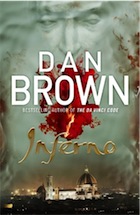
Dan Brown, whose latest book is published this week. Photograph: Dan Courter
1. He might well be the greatest poet who ever lived
 Coming at the top of the list, this might sound like a meaningless statement, but it's important. If by "great" we mean someone who has not ceased to inspire and fascinate from the moment their work became available to the public, someone with extraordinary powers of talent, technical ability and human sympathy, then Dante is inexhaustibly great. (Shakespeare was a dramatist and, let's face it, "Venus and Adonis" is, as they say, a bit of a long walk for a short drink.) The thought that Dan Brown is borrowing Dante's lustre for his latest exercise in milking a gullible public would be utterly depressing if it weren't for the fact that Dante is so far above almost everyone else that there's no point even worrying about it.
Coming at the top of the list, this might sound like a meaningless statement, but it's important. If by "great" we mean someone who has not ceased to inspire and fascinate from the moment their work became available to the public, someone with extraordinary powers of talent, technical ability and human sympathy, then Dante is inexhaustibly great. (Shakespeare was a dramatist and, let's face it, "Venus and Adonis" is, as they say, a bit of a long walk for a short drink.) The thought that Dan Brown is borrowing Dante's lustre for his latest exercise in milking a gullible public would be utterly depressing if it weren't for the fact that Dante is so far above almost everyone else that there's no point even worrying about it.2. He didn't just write the Inferno, you know
No one's going to snigger at you because you haven't read the other two parts of the Commedia (it didn't become known as The Divine Comedy until a couple of centuries later), but it might help to have at least a nodding acquaintance with the Purgatorio and Paradiso. These, especially the latter, are more of an intellectual challenge than the Inferno – there's more theology and science in them, for a start – but they are still surprisingly earthy. They may have fewer farting demons, but there's still plenty of invective directed at a corrupt church.
3. Dante is still incredibly influential
For someone who was writing mainly in the early part of the 14th century, Dante's shadow is long. He was a major influence on the modernists and their followers, especially TS Eliot – "The Waste Land" is stuffed full of references to the Inferno – and Samuel Beckett, whose entire oeuvre could be said to be a reworking of themes and images from Dante. When asked what he wanted to do with his life, Beckett replied: "All I want to do is sit on my arse and fart and think about Dante," but luckily for us he also did a bit of writing as well. Meanwhile, a new translation of the Inferno comes out pretty much every year. More on this in a moment.
4. He was still very much the product of his time
Be prepared, when you read the Inferno, for a lot of stuff about 13th-century Florentine politics. All editions have, or should have, decent notes to get you through this. But a lot of the poem is Dante doing some score‑settling. He loathed some people so much – those who had behaved treacherously to guests – that he couldn't even wait for them to die. Their souls were in Hell while their bodies were alive. Theologically tricky, but Dante sure knew how to bear a grudge.
5. He more or less invented the Italian language
OK, this is a bit of an exaggeration, but in his day there was no country-wide language – rather, several dialects. This is still pretty much the case today, but the reason Italian is the way it is is largely because Dante decided to write his poem in his beloved Tuscan dialect, rather than in Latin. (Boccaccio tells us that Dante started writing it in Latin, but decided early on that it would be better if he reached a larger audience, which among other things was a shrewd financial move. Possibly.)
The rest

No comments:
Post a Comment